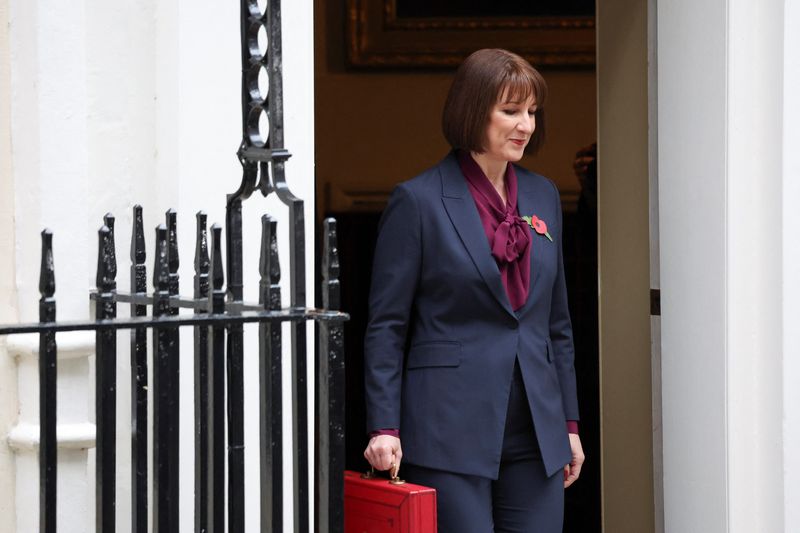By Kate Holton
LONDON (Reuters) - British finance minister Rachel Reeves' first budget marks a huge gamble that she can quickly rebuild the country with the tens of billions of pounds she has raised in taxes, and withstand the anger of businesses charged with funding it.
Reeves and Prime Minister Keir Starmer have struggled with a series of distractions since being elected in July, and the first woman to be British chancellor was under pressure to explain how she could hike taxes to upgrade public services without stunting growth.
In the end, she announced 40 billion pounds ($52 billion) of tax rises, the biggest increase in three decades, and relaxed debt rules to borrow more for investment.
Insisting she was keeping a left-leaning pledge to spare "working people", she directed much of the tax rises at companies, and she also targeted the wealthy, imposing higher rates on areas such as inheritance, capital gains, second homes, private jets and private schools.
Reeves had spent years courting big business, pledging to provide political and regulatory stability, and to work with them to simplify planning rules to help companies grow, in the hope that workers would also benefit from higher salaries.
But they have complained that they will not be able to invest in their operations, and give productivity a much-needed boost, if they have to spend on higher taxes and wages too.
Reeves told parliament she had no choice, saying she had inherited broken public finances and broken public services.
"We are asking business to contribute more," she told parliament. "Successful businesses depend on successful schools. Healthy businesses depend on a healthy NHS. And a strong economy depends on strong public finances."
A senior Labour lawmaker said the party hoped that by bundling the "bad news" in the first budget, the government could then oversee a return to stronger economic growth that would fuel an improvement in public services and lead to an unwinding of tax rises in future fiscal statements.
If that economic growth fails to appear, the Labour government could find itself in deeper trouble.
A budget watchdog said the economy was expected to grow by less than previously forecast between 2026 and 2028 after outperforming only slightly in 2024 and 2025.
MODERN BRITAIN
Labour was elected in July, bringing an end to 14 years of often chaotic Conservative rule, and tasked with modernising British infrastructure and public services, all while hemmed in by high levels of debt and sluggish economic growth.
Reeves managed to increase borrowing without triggering the bond market chaos that brought down former prime minister Liz Truss in 2022, because investors largely accepted her plan to spend on infrastructure.
But the response on the business front was more challenging.
The Institute of Directors said most companies would struggle to look beyond the tax hikes.
"Business leaders can only hope that this is a big bang now, to wipe the slate clean, and that there will be no further shocks of this magnitude in the lifetime of this parliament, enabling business to plan with more confidence," its policy director Roger Barker said.
Critics warned that higher taxes on capital gains, inheritance and wealthy foreign nationals would also risk sapping Britain of its entrepreneurial spirit.
Andrew Noble, partner at Par Equity, a venture capital firm focused on investments in the north of Britain, said the capital gains tax hike would make it harder for Britain to attract and retain the very people who could help deliver "a more prosperous future."
SPENDING SURGE
The budget will enable government spending to increase by almost 70 billion pounds a year - or 2% of economic output - over the next five years - money that Reeves and Prime Minister Keir Starmer say is needed to rebuild Britain's foundations while avoiding a return to the economic austerity imposed by the Conservatives after the 2008 financial crash.
Many public services in Britain have suffered deep underlying funding cuts since then - adding to the anger in the country following a lengthy period of stagnant wages and fractious politics.
Reeves and Starmer will hope that having set out their budget plan, almost four months after they came to power, they can now start to improve the running of hospitals, schools, roads and trains, to reward the voters who elected them.
They also sought to keep voters on side with some softer offers, such as a penny off a pint of draught ale, a freeze on fuel duty and a decision not to drag more people into paying tax.
Jonathan Portes, a King's College London professor who previously worked in the Treasury, said big companies could probably cope with higher social security contributions if the government provided long-term vision and stability to encourage investment.
He said the government now needed to show that it could spend the money effectively, to deliver an early improvement to public services, while investing in infrastructure to boost longer-term growth.

"She has to do both to make this government a success," he said.
($1 = 0.7688 pounds)